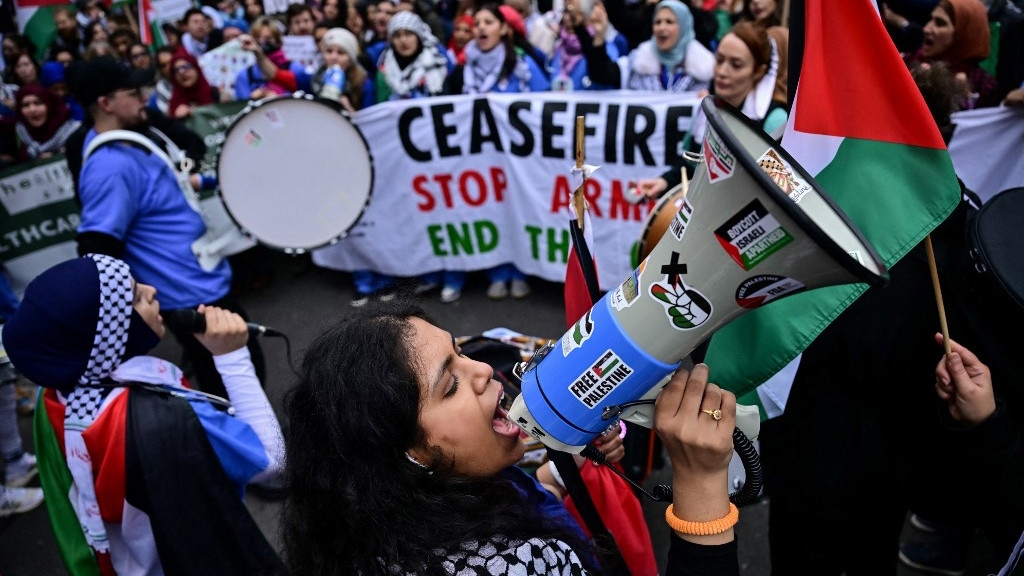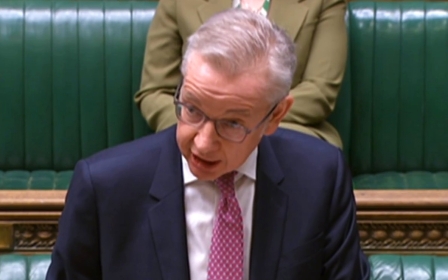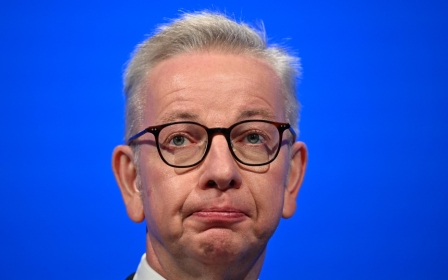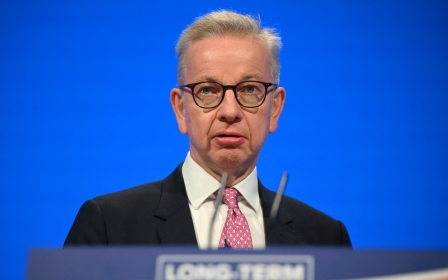Muslim groups challenge Gove to name them 'extremist' outside of parliament

Muslim groups accused of extremism by Britain’s communities secretary Michael Gove have challenged him to forego parliamentary privilege and name them as extremists outside of parliament.
Speaking in Parliament on Thursday, Gove used parliamentary privilege to name Cage International, Mend and the Muslim Association of Britain as extremist groups.
Parliamentary privilege is the legal immunity granted to members of parliament, protecting them from liability for actions performed or things said during statements. This power protects Gove from getting sued by the organisations he named in parliament.
“We will be holding these, and other organisations, to account to assess if they meet our definition of extremism and will take action as appropriate," said Gove.
But following his statement, MAB, a member of the organising committee for the Palestine protests in London, was one of the first groups to call out Gove and challenge him to label it extremist outside the House of Commons.
Stay informed with MEE's newsletters
Sign up to get the latest alerts, insights and analysis, starting with Turkey Unpacked
“If Gove is confident in his views about the Muslim Association of Britain and other organisations, alleging extremist views and a threat to UK society, we challenge him to state them outside parliament,” MAB said in a statement on X.
“However, due to the fear of legal challenges, we know he lacks the courage to do so.”
Azhar Qayum, chief executive of Mend, told LBC radio that it had written to the government to warn them that it intended to take legal action if Mend was included in a list of organisations deemed to be extremist.
"We've sent legal notice to the government threatening legal action if they cite us on any such list," said Qayum.
In a joint statement signed by activist groups Palestine Action and Black Lives Matter UK, Cage said: "Collectively we will explore all avenues, including legal, to challenge the Government’s deep dive into authoritarianism."
The coalition organising the national marches calling for a ceasefire in Gaza stood by MAB and condemned the government's attempt to use the protests to "redefine extremism".
"We reject the description of members of our coalition as extremists who cause division and harm to the Muslim community," the coalition said in a statement.
'Will there be legal avenues to challenge such determinations imposed by the government?'
- Zara Mohammed, Muslim Council of Britain
"No one should take lessons in what is in the interests of Muslims in Britain from a man with a track record of support for anti-Muslim policies, associations and discourse."
The Muslim Council of Britain (MCB), the largest body representing Muslims in the UK, said it was concerned that some organisations affiliated with it would be targeted by the definition, and described the plans as "undemocratic, divisive, and potentially illegal".
Zara Mohammed, secretary general of the MCB, said: “As the government presses ahead with its flawed proposals, many of us are questioning: on what grounds are these groups being labelled as extremist, and will there be legal avenues to challenge such determinations imposed by the government?"
Amnesty International's chief executive, Sacha Deshmukh, said the government's new definition of extremism was a "smash and grab on our human rights" and described it as taking Britain "down the road toward authoritarianism".
"From the prime minister’s disturbing Downing Street speech earlier this month, the introduction of further anti-protest measures and now the expansion of the extremism definition, it looks as if the government is set on shrinking the space for dissenting views and the right to protest," Deshmukh said in a statement.
'This dangerously sweeping approach to labelling groups and individuals extremist is yet another smash and grab on our human rights'
- Sacha Deshmukh, Amnesty International
“An overwhelmingly peaceful protest movement seeking an end to Israel’s mass killing of civilians in Gaza is being used by ministers to clamp down on our civil liberties - the irony is crushing and frightening.
“This dangerously sweeping approach to labelling groups and individuals ‘extremist’ is yet another smash and grab on our human rights by a Government which has become a serial offender in this regard."
Friends of Al-Aqsa, one of the other Muslim groups working with the coalition to organise pro-Palestine marches in London, said it was "alarmed" that Gove had used parliamentary privilege. A spokesman said: “Gove, to advance his ideology, is employing political violence through the power of parliament to undermine the scrutiny of elected members. He is constraining political space for alternative views within a democracy.”
Both Gove and Prime Minister Rishi Sunak had previously suggested that the new measures could be targeted against pro-Palestinian activism and groups alleged to be proponents of Islamist ideology.
In 2021, Islamic affairs commentator Salman Butt successfully sued the British government after it falsely accused him of being a "non-violent extremist" in a Downing Street press release.
The government agreed to delete his name from the press release and pay him compensation and his legal costs. Former home secretary Priti Patel apologised to Butt after five years of litigation.
Middle East Eye delivers independent and unrivalled coverage and analysis of the Middle East, North Africa and beyond. To learn more about republishing this content and the associated fees, please fill out this form. More about MEE can be found here.




